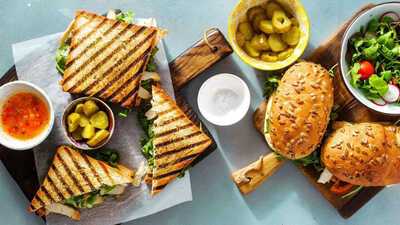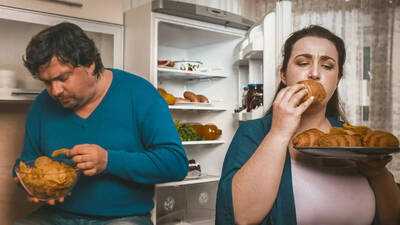In today’s fast-paced world, snacking has become second nature: a handful of nuts between meetings, a cookie mid-afternoon, or a packet of chips before bed. But for many, these “harmless” bites are quietly undermining digestive health. Unlike full meals, snacks are often selected impulsively, with poor balance of nutrients, timing and portion size
Over time, certain snacking habits can disrupt gut motility, alter gut microbiota, provoke inflammation, and trigger symptoms like bloating, gas, reflux or irregular bowel movement. While one ill-advised snack won’t wreck your digestive system overnight, recurring patterns accumulate into chronic strain.
We’ll dig into five of the worst snacking mistakes- ones that are not generic “eat less sugar” advice but rooted in physiology and science- and show how each misstep distorts digestive function.
 Grazing constantly
Grazing constantly
When you snack continuously throughout the day, you disrupt the Migrating Motor Complex (MMC)- a housekeeping wave in your small intestine that kicks in during fasting periods to sweep residual debris, bacteria, and undigested matter forward. Repeated interruption prevents the MMC from completing its cycle, increasing risk of bacterial overgrowth, slowed digestion, and gut stagnation.
In fact, chronically interrupted fasting windows allow bacteria more opportunity to ferment undigested carbohydrates in the small intestine, which may contribute to symptoms like bloating, gas, or small intestinal bacterial overgrowth (SIBO).
Snacking when not truly hungry
Consuming snacks while you aren’t physiologically hungry often means your body isn’t prepared with the right enzymes or motility state to digest well. A study found that snacks consumed in a non-hungry state tend to have low satiating effect, meaning you eat more overall, burdening digestion. Moreover, when you eat “mindlessly” during stress or boredom, chewing is fast, and you may swallow more air, leading to bloating and indigestion. Frequent unnecessary snacks also elevate total daily caloric load and excessive substrate for fermentation in the gut.
Choosing ultra-processed, high-fat, high-sugar snacks

Ultra-processed snacks often lack fiber, quality protein, or beneficial fats, and instead deliver refined carbohydrates, saturated fat, emulsifiers, and additives that stress the gut barrier and microbiome. Such foods can provoke dysbiosis, low-grade inflammation, and slower transit times.
Also, frequent intake of hyperpalatable foods trains your gut to expect fast-release sugars, which can provoke sharper glycemic fluctuations and distress in digestion.
Late-night snacking (especially heavy or acidic foods close to bedtime)
When you snack shortly before lying down, gastric contents remain longer, increasing risk of acid reflux, heartburn, and delayed gastric emptying. Some studies link night snacking to gastrointestinal discomfort. Beyond mechanics, late snack timing misaligns with circadian rhythms of digestive enzymes and insulin sensitivity — your gut is less efficient late at night. This may lead to suboptimal digestion and worsen symptoms in sensitive individuals.

Excessive snacking volume (oversized portions)
Even if a snack’s composition is decent, large portions require more digestive work: more acid, enzyme secretion, gastric stretching, and slower transit. Overloading the GI tract frequently can lead to bloating, fullness, slowed motility, and discomfort. Also, oversized snack portions often push you over your caloric budget, further burdening metabolic digestion. A meta-analysis noted that snack quality is more strongly linked to cardiometabolic health than mere frequency—but volume still matters in the digestive load.
Over time, certain snacking habits can disrupt gut motility, alter gut microbiota, provoke inflammation, and trigger symptoms like bloating, gas, reflux or irregular bowel movement. While one ill-advised snack won’t wreck your digestive system overnight, recurring patterns accumulate into chronic strain.
We’ll dig into five of the worst snacking mistakes- ones that are not generic “eat less sugar” advice but rooted in physiology and science- and show how each misstep distorts digestive function.
 Grazing constantly
Grazing constantlyWhen you snack continuously throughout the day, you disrupt the Migrating Motor Complex (MMC)- a housekeeping wave in your small intestine that kicks in during fasting periods to sweep residual debris, bacteria, and undigested matter forward. Repeated interruption prevents the MMC from completing its cycle, increasing risk of bacterial overgrowth, slowed digestion, and gut stagnation.
In fact, chronically interrupted fasting windows allow bacteria more opportunity to ferment undigested carbohydrates in the small intestine, which may contribute to symptoms like bloating, gas, or small intestinal bacterial overgrowth (SIBO).
Snacking when not truly hungry
Consuming snacks while you aren’t physiologically hungry often means your body isn’t prepared with the right enzymes or motility state to digest well. A study found that snacks consumed in a non-hungry state tend to have low satiating effect, meaning you eat more overall, burdening digestion. Moreover, when you eat “mindlessly” during stress or boredom, chewing is fast, and you may swallow more air, leading to bloating and indigestion. Frequent unnecessary snacks also elevate total daily caloric load and excessive substrate for fermentation in the gut.
Choosing ultra-processed, high-fat, high-sugar snacks
Ultra-processed snacks often lack fiber, quality protein, or beneficial fats, and instead deliver refined carbohydrates, saturated fat, emulsifiers, and additives that stress the gut barrier and microbiome. Such foods can provoke dysbiosis, low-grade inflammation, and slower transit times.
Also, frequent intake of hyperpalatable foods trains your gut to expect fast-release sugars, which can provoke sharper glycemic fluctuations and distress in digestion.
Late-night snacking (especially heavy or acidic foods close to bedtime)
When you snack shortly before lying down, gastric contents remain longer, increasing risk of acid reflux, heartburn, and delayed gastric emptying. Some studies link night snacking to gastrointestinal discomfort. Beyond mechanics, late snack timing misaligns with circadian rhythms of digestive enzymes and insulin sensitivity — your gut is less efficient late at night. This may lead to suboptimal digestion and worsen symptoms in sensitive individuals.
Excessive snacking volume (oversized portions)
Even if a snack’s composition is decent, large portions require more digestive work: more acid, enzyme secretion, gastric stretching, and slower transit. Overloading the GI tract frequently can lead to bloating, fullness, slowed motility, and discomfort. Also, oversized snack portions often push you over your caloric budget, further burdening metabolic digestion. A meta-analysis noted that snack quality is more strongly linked to cardiometabolic health than mere frequency—but volume still matters in the digestive load.
You may also like

Two years since October 7: Hamas–Israel meet in Egypt for talks – last shot at peace?

'Assault on Constitution': Rahul condemns attack on CJI; Congress slams 'hate culture'

Tier II, III cities outshine metros with 21 pc hiring surge in Sep: Report

Girl, 4, left orphaned after mum and dad die in scalding hot hotel bathtub

Felt like a 'nausikhiya': Amitabh Bachchan recalls how Farhan Akhtar made him feel during film shoot





